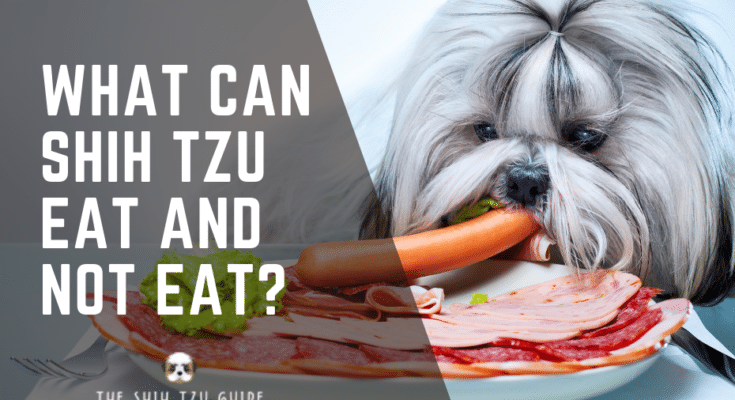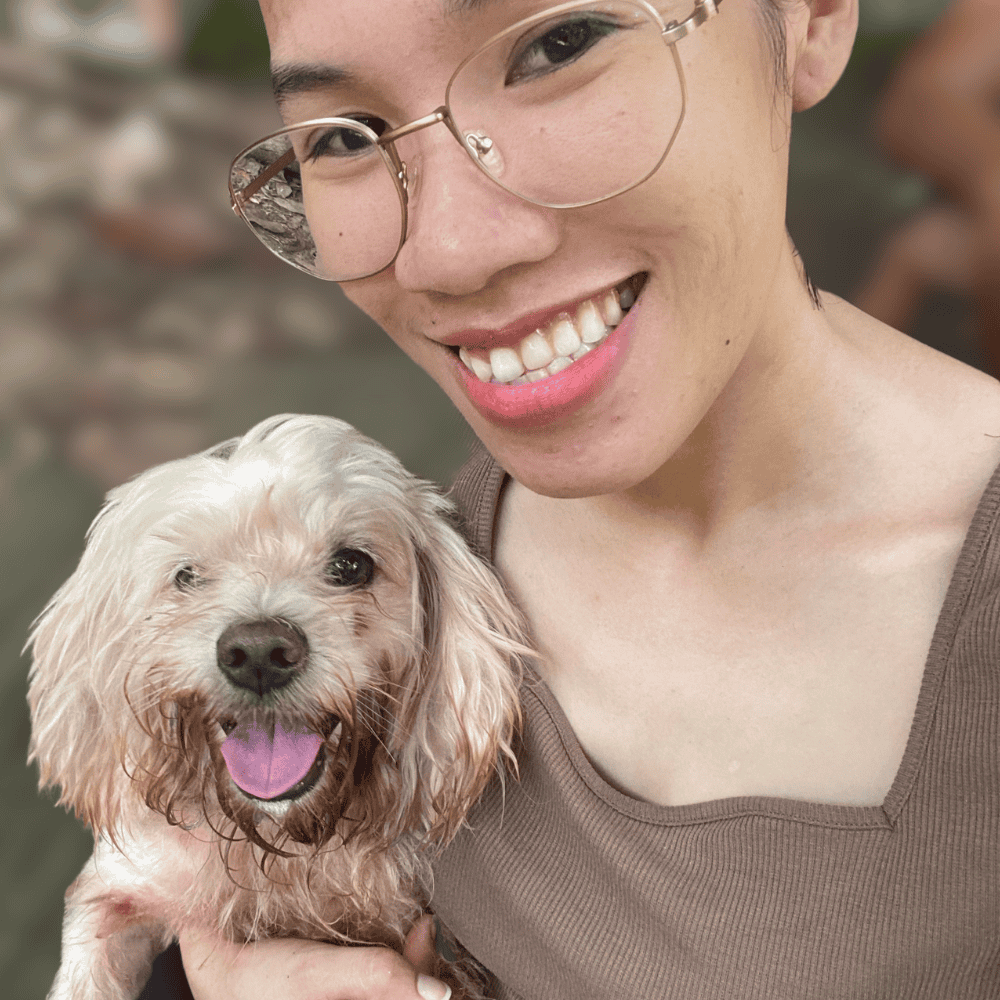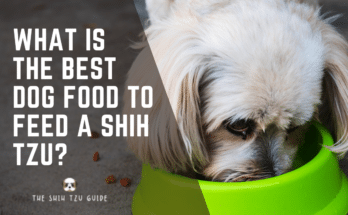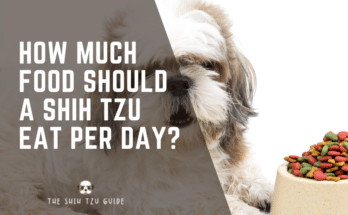If you’re a first-time Shih Tzu owner — or even a first-time dog owner — you’re probably excited to explore all the treats and food options out there, whether from the pet store or your own kitchen. I was exactly the same when I brought home my little Cooper. I quickly learned how tricky feeding a Shih Tzu can be.
Like many dogs, Cooper seemed to love chicken. But to my surprise, he started developing rashes, and his beautiful coat began to fall out. I didn’t connect the dots at first. Even when I switched to a dry dog food labeled only “chicken flavor,” the same thing happened again. I thought: “How can this be? It’s just a flavoring!” Well, it turns out Cooper is allergic to chicken — flavoring or not.
That experience made me realize how important it is to know exactly what can Shih Tzu eat and what foods can Shih Tzu not eat. Like many new owners, I spent hours searching for a reliable Shih Tzu food list that clearly explains what’s safe and what’s not.
If you’re wondering the same, you’re in the right place. This guide will walk you through everything you need to know about safe foods, toxic foods, and how to make better choices for your Shih Tzu’s diet.
What Can Shih Tzu Eat and Not Eat?
Toxic Foods to Avoid!
While some foods are perfectly fine for your Shih Tzu, others can be harmful or even toxic. Certain ingredients commonly found in our diet can trigger allergies, digestive issues, or serious health problems in dogs. This section will help you clearly understand what foods can Shih Tzu not eat so you can avoid accidental mistakes and keep your pup safe.
1. Chocolate
Chocolate is one of the toxic foods you cannot feed to your Shih Tzu. They are obsessed with the smell and taste of chocolate, so keep it out of their reach.
It has an ingredient of theobromine, a chemical like caffeine with a similar effect on the nervous system. Theobromine is found in cocoa beans, which are processed to form chocolate.
High doses of theobromine can cause vomiting, diarrhea, labored breathing, hyperactivity, shaking, tremors, seizures, abnormal heart rhythms, coma, and even death.
Chocolate is also associated with pancreatitis in dogs because of its high-fat content. When your dog eats too much food with high-fat content, it may develop pancreatitis.
If you suspect your dog has eaten chocolate, call an emergency veterinarian right away because it might be a life-or-death situation.
2. Cooked Bones
Bones are a favorite food of dogs. Everyone knows that dogs adore bones, but they are dangerous! Chicken and fish bones are the most harmful. If you’re offering your Shih Tzu fresh-cooked chicken or fish for lunch, double-check that all the bones have been removed before placing them in their bowl.
Cooked bones become brittle and prone to breaking apart. Accordingly, Shih Tzus are at serious risk of serious health problems and even death if they eat roasted bones.
3. Onions, Garlic, Leeks, and Chives
These foods are all members of the Allium family. Anything in this bracket is poisonous to Shih Tzus, whether boiled, cooked, or otherwise — it’s not something your Shih Tzu should eat at any time.
These foods are thought to make dogs sick and can cause red blood cell damage if consumed in excessive quantities. Poisoning symptoms may not appear right away because the toxic effects can take many days to develop.
4. Grapes and Raisins
Grapes and raisins are other groups of fruits that can be harmful to your Shih Tzu. They are a poisonous meal for Shih Tzus that, if consumed in high amounts, can cause kidney failure.
5. Artificial Sweetener
Xylitol, widely found in mints and sugar-free gums, is one of the most dangerous substances a Shih Tzu can consume. According to a study, it is 100 times more poisonous to dogs than chocolate.
If your dog eats just one stick of xylitol gum, its blood sugar levels will drop.
If the small dog ate an entire pack of gum with ten sticks containing poisonous xylitol, its life would be severely damaged, and it could even die.
6. Salt
Salt content is like that of a lot of sugar. Food heavy in sodium has the potential to poison your Shih Tzu, but it is more likely to cause severe thirst and increased urine in the same volume as dropped food.
Avoid foods such as ham and bacon, as these foods contain high salt levels.
Salt in excess can cause vomiting, diarrhea, depression, tremors, increased body temperature, and seizures in Shih Tzus.
7. Coconut and Coconut Oil
Although a small amount of coconut is unlikely to hurt your Shih Tzu, the milk and white flesh have been known to upset dogs’ stomachs.
Coconut water should be avoided because of its high potassium content.
8. Bread Dough
Do you love making bread? If that’s the case, make sure you don’t drop any dough on the kitchen floor for your Shih Tzu to eat.
Bread dough is identified as a food hazard for dogs in the Merck Veterinary Manual. When a dog consumes bread dough, the yeast in the dough continues to rise, causing his stomach to enlarge and deadly levels of ethanol to enter his bloodstream.
The rising dough’s pressure can resemble and produce bloating, but the real danger is alcohol toxicosis.
9. Milk and Dairy Products
Lactose intolerance is common in Shih Tzus, which means dairy products might make them sick. Dogs’ digestive systems are not the same as ours, and they may struggle to break down lactose in milk, resulting in runny diarrhea.
10. Avocado
Fruit is good for Shih Tzus, but not all fruit is good! Avocado is one of them, as it is one of the most hazardous foods for your pet.
Avocados contain a toxin called persin, which can cause vomiting and diarrhea if consumed in high numbers. Persin is concentrated largely in the avocado skin and pit rather than the fleshy part.
So, if your Shih Tzu eats one avocado, you’re unlikely to have any issues.
11. Macadamia Nuts and Walnuts
All nuts should be avoided in a Shih Tzu diet because of their size and texture, which might cause choking. These two nuts—Macadamia and Walnuts—are harmful to dogs.
Both can cause diarrhea, illness, and the danger of canine pancreatitis if consumed in large quantities.
Macadamia nut poisoning can cause hyperthermia, tremors, vomiting, and lethargy in Shih Tzus. The poisoning can cause hyperthermia, tremors, vomiting, and lethargy.
12. Moldy Food
If your dog has access to trash, take caution. Moldy food can contain mycotoxins, which are harmful to Shih Tzus. Mycotoxins grow on moldy food, making it poisonous when eaten.
13. Some Peanut Butter Products
Peanut butter is a favorite of our Shih Tzu. It’s one of his favorite treats, especially in a Kong Toy.
Some peanut butter brands include xylitol. This drug is poisonous to dogs and should be avoided at all costs.
14. Alcohol
This is the best time to discuss the risks of alcohol and how deadly it may be for pets.
Shih Tzus can suffer from diarrhea, vomiting, trouble breathing, tremors, abnormal blood acidity, central nervous system depression, and even die if they drink alcohol.
15. Mustard Seed
Mustard makes Shih Tzus vomit, which vets use to make them ill for medical reasons. The seeds are harmful to dogs because they contain poisonous elements.
Safe Foods for Shih Tzus
Not all human food is bad for dogs! In fact, there are plenty of healthy, safe, and nutritious options you can share with your Shih Tzu. This part of the Shih Tzu food list includes foods that are generally safe for your dog and can support their overall health, coat condition, and energy levels. If you’ve been wondering what can Shih Tzu eat, here are some great choices.
1. Organs (Liver or Heart)
Shih Tzu can consume liver because it is rich in vitamins and protein. The liver also cleanses the blood of contaminants and maintains healthy vision. It also has iron, copper, zinc, and vital fatty acids.
2. Fish
Fish can be a healthy addition to your dog’s diet if it is properly cooked and free of added oils and flavors.
Make sure to remove the bones and avoid fish with high mercury levels, such as tuna.
3. White Chicken Meat
Chicken might be the appropriate protein for your Shih Tzu if he’s trying to lose weight. The best option is to feed your Shih Tzu white meat chicken. You must avoid fattier cuts of meat like beef or lamb.
4. Baby Carrots
Baby carrots are a low-calorie and nutritious treat for your dog.
Raw baby carrots are fine due to the extra benefit of cleaning the dog’s teeth as they chew. But cooked carrots are preferable if you want them to get the entire nutritional benefit.
5. Sweet Potato
Sweet potato is a natural, safe, and healthy treat for your Shih Tzu as it has a variety of health benefits. You should not give raw potatoes to your dog. Instead, make sure it is cooked and the skin is removed.
6. Rice
Rice is one of the most famous foods. Can dogs consume rice? Yes, it is correct. Commercial dog foods often contain rice as an ingredient.
In cases of diarrhea, rice can assist in binding the stool. Because our dogs need starch, white rice is more popular. However, brown rice is preferable if your dog is diabetic.
7. Green Beans
Among other vitamins and minerals, green beans are rich in protein, iron, calcium, and vitamins B6, A, C, and K. They are also low in calories and contain a lot of fiber, making them good for dogs and humans.
8. Raspberries and Blueberries
These foods are safe to feed to your dog, but only in small amounts.
It has an antioxidant that is beneficial to your dog. If you own a senior Shih Tzu, it can help relieve joint pain because of the anti-inflammatory effect.
9. Pumpkin
Feeding your dog pumpkin is a big yes!
Fresh and canned pumpkin are both healthy sources of nutrients and fiber, but canned pumpkin has a higher fiber and nutrient content than fresh pumpkin.
What Action to Take If Your Shih Tzu Becomes Unwell After Eating
Consult your veterinarian when your Shih Tzu frequently vomits or seems weak and lethargic after eating. However, you can follow our advice below if your pet remains bright and keen to eat.
If your Shih Tzu is unwell or has diarrhea, this is a typical problem caused by feeding them inappropriate food. You can check again for food that you should not feed your dog, as listed above.
Do not allow your dog to drink too much at once. If you give your dog a lot of water, they may vomit even more and become dehydrated.
Little and often, provide cooled or boiled water.
It might be helpful if you skip a meal and still allow access to water if your pet is vomiting and not eating. As you prepare the white meat diet, provide small portions of boiled chicken or boiled fish (cod or coley) to accompany the white rice.
If no vomiting occurs, give tiny doses every two hours for the first day, then larger amounts less often over the next few days.
Start doing the regular diet if everything goes well.
Frequently Asked Questions
What fruit can Shih Tzu not eat?
Can Shih Tzu eat pizza?
Most likely not.
If your dog eats pizza, keep an eye on them. Pizza provides very little nutrients to dogs; even the meats on pizza are often heavily processed and heavy in sodium.
Even if your dog can eat small portions of pizza, it’s recommended that you stay away from it.
Can Shih Tzu eat spaghetti?
You should not feed your dog spaghetti.
A moderate amount of plain pasta will not harm your dog. However, if paired with the sauce, it is most likely to poison your dog because of its ingredients, such as onion and garlic.
Can Shih Tzu eat bananas?
Yes! Bananas are good, especially when given in moderation. Banana is loaded with potassium, vitamin B6, and vitamin C. In fact, this fruit is recommended by veterinarians as a healthier alternative to fatty, salty snacks.
Can Shih Tzu eat a hot dog?
Hot dogs are a no-no for your Shih Tzu. It contains many added ingredients, which are not ideal for your Shih Tzu diet.
Are eggs good for Shih Tzu?
Dogs are perfectly safe around eggs. Your Shih Tzu will benefit from the nutrition provided by eggs. These foods are high in protein, vitamins, and fatty acids that help support your dog on the inside and out.
Keep in mind that eggs are only as good as the chicken they came from.
What are Shih Tzus allergic to?
Shih Tzu can have allergies for various reasons.
These allergens include contact allergy, flea allergy, food allergy, and inhalant allergy. It is important to always consult your vet.
Conclusion
Ultimately, you should be careful not to feed your Shih Tzus foods that are toxic to dogs or human-grade foods containing minerals and harmful ingredients. The list above contains food items safe for Shih Tzu consumption, but you should also consult your veterinarian about what to feed your pets.
We hope you have learned a bit more about Shih Tzu food and nutrition and are now better prepared to feed your pet in the most nutritious way possible. Good luck and happy fur-parenting!



